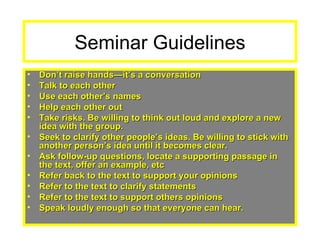Session 8
- 1. Teacher, Students, Parents, Community’s Role in Education
- 2. Agenda Evaluations Journal: Ideal World---stakeholders roles? Teacher’s Roles Handout View brief video “Whole Child” Read and discuss Blog Responses to “Whole Child” Socratic Seminar: What Makes a Perfect Parent? Discuss Implications “Knowledge Arts” School Reform Model Presentations Wrap Up—Paper Two Returned with Rubric
- 3. Quickwrite In an ideal world, how would parents, students, teachers, and communities function for education to be successful? What do you feel are the main reason’s these stakeholders have not been able to successfully educate “every child?”
- 4. Teacher’s Roles Handout Simply enjoy!
- 5. The Whole Child Video 4 min overview presented by ACSD.
- 6. Blog Response to “The Whole Child Report” by ASCD In response to the “Whole Child” article, I do agree with Faith and Rebecca. It is true that students are not being taught “who they are” in school. The mandates that restrict our freedom to teach what we want definitely have something to do with this. However, as well intended as this article may be, I believe it is heavy on idealism while falling short on offering many practical solutions. I refer specifically to quotes like this one: “Community members must become partners with educators. They need to become resources for learning that allow schools to become powerful agents for change in the lives of their students and families….” (Pg. 10) Yes, of course students would benefit from community involvement. If communities got half as involved in school (even a quarter?) as much as teachers do we would have a much more relevant base to work from. Students would see how the community cares and how they could make powerful, positive impacts on their caring communities. So how do we get the communities involved? Is ASCD sending literature out to families across America imploring them to become involved? No. For schools to get messages to the communities, they have to put together community meetings or barbecues or whatever may get people to come out and listen. And when I say “schools” have to do that, I really mean “teachers”. I have personally been involved in some of these community outreach activities and seen modest results. Nonetheless, I believe that teachers ultimately bear this burden of luring the community into becoming involved in public education.
- 7. Most of those things involve creating an in-class environment that can serve as an oasis rather than a prison for students. We have the ability to recognize students for all of their qualities, and I do believe we need to emphasize successes beyond traditional subject matter. But let’s do it in a way that is realistic and achievable. “There are many things out of our control that contribute to the withering state of standards-based education.” [How a teacher reacts to these things makes the difference]
- 8. Do you agree or disagree with this reaction why or why not?
- 9. What Makes a Perfect Parent?
- 10. What is a Socratic Seminar? A Socratic Seminar is method to try to understand information by creating a conversation in class in regards to a specific text. In a Socratic Seminar, participants seek deeper understanding of complex ideas in the text through rigorously thoughtful dialogue, rather than by memorizing bits of information. A Socratic Seminar opens with a question from any of the participants . A good opening question leads participants back to the text as they speculate, evaluate, define, and clarify the issues involved.
- 11. Intro to Socratic Seminar What does Socratic mean? Socratic comes from the name Socrates. Socrates (ca. 470-399 B.C.) was a Classical Greek philosopher who developed a Theory of Knowledge. What was Socrates' Theory of Knowledge? Socrates was convinced that the surest way to attain reliable knowledge was through the practice of disciplined conversation. He called this method dialectic .
- 12. Seminar Guidelines Don’t raise hands—it’s a conversation Talk to each other Use each other’s names Help each other out Take risks. Be willing to think out loud and explore a new idea with the group. Seek to clarify other people’s ideas. Be willing to stick with another person’s idea until it becomes clear. Ask follow-up questions, locate a supporting passage in the text, offer an example, etc Refer back to the text to support your opinions Refer to the text to clarify statements Refer to the text to support others opinions Speak loudly enough so that everyone can hear.
- 13. Knowledge Arts? How does this article relate to your school reform model or does it? How do meaning-making classrooms transform the statement “knowledge is power” into a reality according to the article? What aspects of this article would you like to discuss with your group? What did you find most interesting?
- 14. School Reform Model Presentations
- 15. Wrap Up Preparation for next class… Review article: “Segregation of American Teachers” assigned last week






![Most of those things involve creating an in-class environment that can serve as an oasis rather than a prison for students. We have the ability to recognize students for all of their qualities, and I do believe we need to emphasize successes beyond traditional subject matter. But let’s do it in a way that is realistic and achievable. “There are many things out of our control that contribute to the withering state of standards-based education.” [How a teacher reacts to these things makes the difference]](https://image.slidesharecdn.com/session-8-1196032928870674-2/85/Session-8-7-320.jpg)







